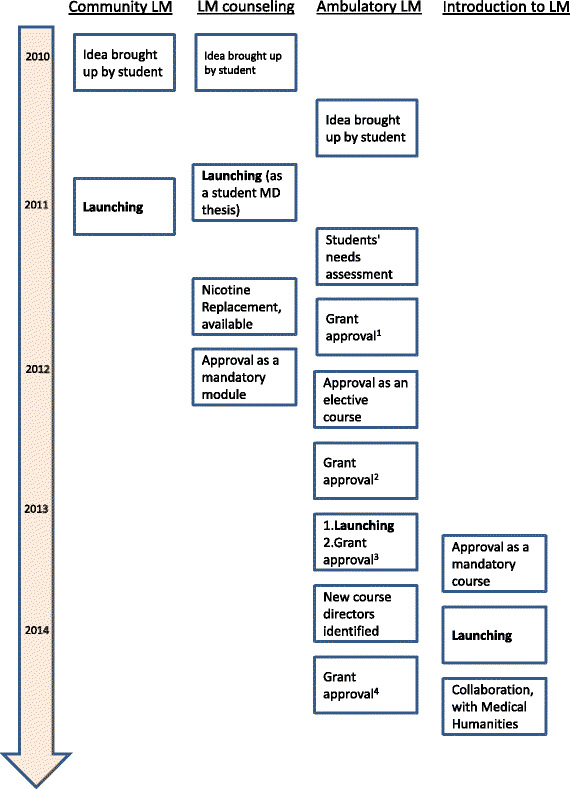Medical students as health coaches: Implementation of a student-initiated Lifestyle Medicine curriculum
- PMID: 29121991
- PMCID: PMC5680812
- DOI: 10.1186/s13584-017-0167-y
Medical students as health coaches: Implementation of a student-initiated Lifestyle Medicine curriculum
Abstract
Background: By 2020, the World Health Organization predicts that two-thirds of all diseases worldwide will be the result of lifestyle choices. Physicians often do not counsel patients about healthy behaviors, and lack of training has been identified as one of the barriers. Between 2010 and 2014, Hebrew University developed and implemented a 58-h Lifestyle Medicine curriculum spanning five of the 6 years of medical school. Content includes nutrition, exercise, smoking cessation, and behavior change, as well as health coaching practice with friends/relatives (preclinical years) and patients (clinical years). This report describes this development and diffusion process, and it also presents findings related to the level of acceptance of this student-initiated Lifestyle Medicine (LM) curriculum.
Methods: Students completed an online semi-structured questionnaire after the first coaching session (coaching questionnaire) and the last coaching session (follow-up questionnaire).
Results: Nine hundred and twenty-three students completed the coaching questionnaire (296 practices were with patients, 627 with friends /relatives); and 784 students completed the follow-up questionnaire (208 practices were with patients, 576 with friends /relatives). They reported overall that health coaching domains included smoking cessation (263 students), nutrition (79), and exercise (117); 464 students reported on combined topics. Students consistently described a high acceptance of the curriculum and their active role in coaching. Further, most students reported that they were eager to address their own health behaviors.
Conclusions: We described the development and acceptance of a student-initiated comprehensive LM curriculum. Students perceived LM as an important component of physicians' professional role and were ready to explore it both as coaches and in their personal lives. Thus, medical school deans might consider developing similar initiatives in order to position medical schools as key players within a preventive strategy in healthcare policy.
Keywords: Health coaching; Lifestyle Medicine; Medical school; Student led curriculum.
Conflict of interest statement
Ethics approval and consent to participate
This program was determined as not a human subjects research by the Hadassah Hebrew University Medical Center Committee on Human Studies and exempt from further review.
Consent for publication
NA.
Competing interests
The authors declare that they have no competing interests in this section.
Publisher’s Note
Springer Nature remains neutral with regard to jurisdictional claims in published maps and institutional affiliations.
Figures
Comment in
-
Medical students as health coaches, and more: adding value to both education and patient care.Isr J Health Policy Res. 2017 Nov 30;6(1):65. doi: 10.1186/s13584-017-0190-z. Isr J Health Policy Res. 2017. PMID: 29191229 Free PMC article.
Similar articles
-
"It's All About the Trust And Building A Foundation:" Evaluation of a Longitudinal Medical Student Coaching Program.Teach Learn Med. 2023 Oct-Dec;35(5):550-564. doi: 10.1080/10401334.2022.2111570. Epub 2022 Aug 22. Teach Learn Med. 2023. PMID: 35996842
-
Including lifestyle medicine in undergraduate medical curricula.Med Educ Online. 2015 Feb 3;20:26150. doi: 10.3402/meo.v20.26150. eCollection 2015. Med Educ Online. 2015. PMID: 25652118 Free PMC article.
-
Executive/life coaching for first year medical students: a prospective study.BMC Med Educ. 2019 May 22;19(1):163. doi: 10.1186/s12909-019-1564-4. BMC Med Educ. 2019. PMID: 31118014 Free PMC article.
-
Health care economics, financing, organization, and delivery.Fam Med. 2004 Jan;36 Suppl:S20-30. Fam Med. 2004. PMID: 14961399 Review.
-
Designing a Comprehensive Undergraduate Medical Education Radiology Curriculum Using the 5C's of Radiology Education Framework.Can Assoc Radiol J. 2018 Nov;69(4):362-366. doi: 10.1016/j.carj.2018.06.005. Epub 2018 Oct 11. Can Assoc Radiol J. 2018. PMID: 30318455 Review.
Cited by
-
Four-year longitudinal culinary and lifestyle medicine track for undergraduate medical students: development and implementation.Med Educ Online. 2024 Dec 31;29(1):2372919. doi: 10.1080/10872981.2024.2372919. Epub 2024 Jul 2. Med Educ Online. 2024. PMID: 38954754 Free PMC article.
-
Analysis of American Medical Students' Knowledge of Physical Activity Recommendations.PRiMER. 2021 Jan 1;5:31. doi: 10.22454/PRiMER.2021.249084. eCollection 2021. PRiMER. 2021. PMID: 34841206 Free PMC article.
-
Awareness, Knowledge, and Attitudes Regarding Health Coaching Among Umm Al-Qura University Public Health Students.Cureus. 2023 Nov 1;15(11):e48135. doi: 10.7759/cureus.48135. eCollection 2023 Nov. Cureus. 2023. PMID: 38046712 Free PMC article.
-
Personal Health Practices and Perceptions of Lifestyle Counseling and Preventive Services Among Residents.Am J Lifestyle Med. 2020 Jan 20;16(2):203-213. doi: 10.1177/1559827619896301. eCollection 2022 Mar-Apr. Am J Lifestyle Med. 2020. PMID: 35370512 Free PMC article.
-
Medical students as health coaches, and more: adding value to both education and patient care.Isr J Health Policy Res. 2017 Nov 30;6(1):65. doi: 10.1186/s13584-017-0190-z. Isr J Health Policy Res. 2017. PMID: 29191229 Free PMC article.
References
-
- Levin D. Encouraging healthy behavior – physical activity (Hebrew). The committee for healthy behavior, Ministry of health, Israel, 2011. http://www.health.gov.il/PublicationsFiles/2020-sport-final.pdf Accessed December 9, 2015.
-
- Mabat cohort, national health and nutrition cohort survey ages 35–74 (Hebrew). The Israeli Center for Disease Control, Israeli Ministry of Health, 2014. http://www.health.gov.il/PublicationsFiles/mabat_cohort_2014.pdf Accessed December 9, 2015.
Publication types
MeSH terms
LinkOut - more resources
Full Text Sources
Other Literature Sources


